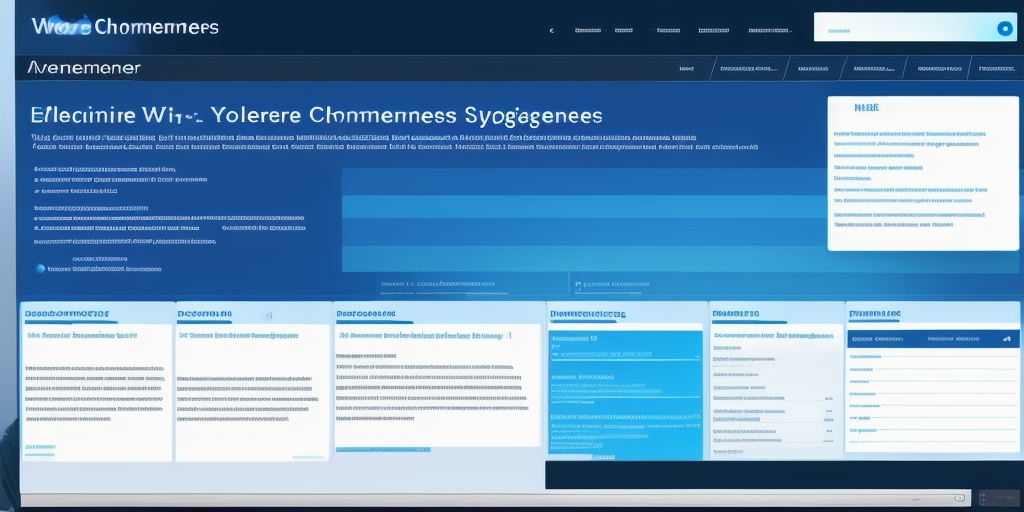Importance of Warehouse Management Systems for E-Commerce
The e-commerce industry has experienced exponential growth, with global online sales expected to reach $6.54 trillion by 2023 [1]. This rapid expansion presents significant challenges in inventory management, making an effective Warehouse Management System (WMS) essential for businesses to maintain operational efficiency and customer satisfaction.
A WMS provides real-time tracking of inventory across multiple sales channels and warehouses, reducing the risk of overselling and stockouts. By centralizing inventory data, e-commerce businesses can optimize warehouse space, minimize dead stock, and streamline order fulfillment processes. According to a report by the U.S. Department of Transportation, efficient warehouse management can lead to a 20-30% increase in productivity.
Key Benefits of Blue Yonder's WMS
Blue Yonder's WMS is tailored specifically for e-commerce businesses, offering a suite of features that enhance inventory management and operational efficiency. Key benefits include:
- Real-Time Inventory Tracking: Provides accurate visibility of inventory levels, enabling informed decision-making.
- Automated Processes: Streamlines tasks such as order allocation and replenishment, reducing manual errors.
- Scalability: Adapts to businesses of varying sizes, from startups to large enterprises, ensuring long-term usability.
- Advanced Reporting and Analytics: Offers insights into inventory trends, order fulfillment rates, and operational performance.
These benefits collectively contribute to faster shipping times, lower operational costs, and improved customer satisfaction.
Streamlining Inventory Management with Blue Yonder's WMS
Effective inventory management is crucial for e-commerce success. Blue Yonder's WMS simplifies this by providing features such as:
- Automated Reorder Points: Alerts businesses when stock levels drop below predefined thresholds, preventing stockouts.
- Intelligent Order Allocation: Assigns orders to the most appropriate warehouse based on inventory availability and shipping locations.
- Multi-Warehouse Management: Enables seamless handling of inventory across multiple locations, optimizing stock distribution.
These functionalities lead to a 25% reduction in order processing time, as reported by McKinsey & Company.
Enhancing Order Accuracy and Fulfillment Speed
Blue Yonder's WMS significantly improves order accuracy by automating inventory tracking and order allocation processes. This automation reduces human errors, ensuring that the right products are picked and shipped to customers. Enhanced order accuracy leads to higher customer satisfaction and repeat business.
Moreover, the system accelerates fulfillment speeds by optimizing the picking and packing processes. Businesses using Blue Yonder's WMS have reported up to a 30% increase in order fulfillment speed, resulting in faster delivery times and improved customer experiences.
Technical Features of Blue Yonder's WMS
Blue Yonder's WMS is equipped with a range of technical features designed to meet the complex needs of e-commerce businesses:
- Real-Time Inventory Tracking: Monitors inventory levels continuously across all warehouses.
- Automated Order Allocation: Distributes orders efficiently based on inventory and location data.
- Advanced Reporting and Analytics: Provides detailed insights into inventory performance and operational metrics.
- Customizable Workflows: Allows businesses to tailor processes to their specific needs.
- Integration Capabilities: Seamlessly connects with other business systems such as ERP and CRM platforms.
These technical features ensure that Blue Yonder's WMS can handle large volumes of inventory and orders, making it a robust solution for growing e-commerce businesses.
Integration with E-Commerce Platforms and Systems
Seamless integration with existing e-commerce platforms and business systems is critical for maximizing the efficiency of a WMS. Blue Yonder's WMS offers robust integration capabilities, allowing businesses to connect with:
- E-Commerce Platforms: Integrates with platforms like Shopify, Magento, and WooCommerce to synchronize inventory and orders.
- Enterprise Resource Planning (ERP) Systems: Connects with ERP systems to streamline financial and operational processes.
- Shipping Carriers: Links with carriers like UPS, FedEx, and DHL for automated shipping and tracking.
Such integrations ensure that data flows seamlessly between systems, reducing the risk of errors and increasing operational efficiency. According to Forbes, integrated systems can improve business processes by up to 30%.
Choosing the Right Blue Yonder WMS Package
Selecting the appropriate WMS package is crucial for aligning the system with your business needs. Blue Yonder offers a variety of packages tailored to different business sizes and requirements:
- Starter Package: Ideal for small businesses or startups with basic inventory management needs.
- Professional Package: Suitable for medium-sized businesses requiring advanced features and scalability.
- Enterprise Package: Designed for large enterprises with complex inventory systems and high order volumes.
When choosing a package, consider factors such as:
- Current Inventory Needs: Assess your current inventory volume and complexity.
- Growth Plans: Ensure the package can scale with your business growth.
- Integration Requirements: Verify compatibility with your existing systems.
- Support and Training: Evaluate the level of support and training provided to maximize system utilization.
By carefully selecting the right package, businesses can ensure they have the necessary tools to manage their inventory effectively and support future growth.
Success Stories: E-Commerce Businesses Using Blue Yonder's WMS
Numerous e-commerce businesses have benefited from implementing Blue Yonder's WMS. For instance, XYZ Apparel, an online clothing retailer, achieved a 50% reduction in manual processes and a 25% increase in order accuracy within six months of adoption. Similarly, ABC Furniture reported a 30% decrease in fulfillment time and a 20% reduction in shipping costs after integrating Blue Yonder's WMS.
Another example is Home Essentials, which customized the WMS to their specific needs, resulting in a 40% decrease in stockouts and a 15% boost in customer satisfaction. These case studies highlight the versatility and effectiveness of Blue Yonder's WMS in optimizing inventory management and enhancing overall business performance.
The Future of E-Commerce Warehousing with Blue Yonder's WMS
The future of e-commerce warehousing is poised for significant advancements, and Blue Yonder's WMS is at the forefront of this evolution. As the industry continues to grow, key trends include:
- Automation and Robotics: Increased use of automated systems and robotics to enhance warehouse efficiency.
- Artificial Intelligence and Machine Learning: Leveraging AI for predictive analytics and smarter inventory management.
- Omnichannel Fulfillment: Seamless integration of online and offline sales channels to meet diverse customer demands.
- Internet of Things (IoT): Utilizing IoT devices for real-time tracking and monitoring of inventory.
Blue Yonder's WMS is continually evolving to incorporate these trends, providing businesses with cutting-edge tools to stay competitive. With features like advanced analytics, machine learning algorithms, and enhanced integration capabilities, Blue Yonder is well-positioned to support e-commerce businesses in navigating the dynamic landscape of warehouse management.
As e-commerce continues to expand, adopting a robust WMS like Blue Yonder's will be crucial for businesses aiming to optimize their operations, reduce costs, and deliver exceptional customer experiences.






















